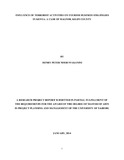| dc.contributor.author | Wakanini, Henry P N. | |
| dc.date.accessioned | 2014-07-03T08:24:54Z | |
| dc.date.available | 2014-07-03T08:24:54Z | |
| dc.date.issued | 2014-01 | |
| dc.identifier.citation | Wakanini,H.P.N.,January,2014. Influence Of Terrorist Activities On Tourism Business Strategies In Kenya: A Case Of Malindi, Kilifi County,A Research Project Report Submitted In Partial Fulfillment Of The Requirements For The Award Of The Degree Of Master Of Arts In Project Planning And Management Of The University Of Nairobi. | en_US |
| dc.identifier.uri | http://hdl.handle.net/11295/71724 | |
| dc.description.abstract | The purpose of the study was to examine the influence of terrorist attacks on the tourism sector particularly in Malindi town in Kilifi County. The study was guided by the following specific objectives: to establish the influence of terrorist attacks on tourism business strategies in Malindi town; to assess the effect of terrorist kidnappings on tourism business strategies in Malindi town and to determine the influence of the terrorist threats on tourism business strategies in Malindi town. The researcher employed descriptive survey analysis using both qualitative and quantitative approach. Sample population of 100 respondents was selected through cluster sampling comprising of hotel industry, Tours and Safaris, Police and Tourism Ministry. The validity of the questionnaires was ascertained by reviewing the questionnaires. The questionnaires were analyzed using both descriptive and inferential statistics and presented in form of tables, and graphs. From the findings of the study 55% of the respondents were aware of attacks and the number of foreign tourists was reduced by 46% after actual attacks. It was concluded that the effects of terrorism in tourist areas have an adverse effect on the economy of that country as seen with Kenya. The situation is made worse by the travel advisories that ensues such attacks which makes tourists to opt for other secure destinations. A total of 55% of respondents indicated awareness of terrorist kidnappings with majority of the cases being resolved through rescue missions and ransom payments. Tourism is a provider of employment and economic prosperity in many countries including Kenya, the tourist industry must be able to remain resilient in the face of adversity. Majority of the respondents indicated that the cost of doing business had gone up due to the need to improve security measures. The attacks also reduced the staff productivity due to fear of attacks and uncertainty of job security due to reduced visitors thus compromising their ability to provide for their families. Although tourists act as an easy target for terrorists if the industry remains flexible in its ability to diversify when tourism numbers take a downturn it will help ensure economic prosperity is maintained and defeat the primary objectives of the terrorist groups. The study recommended that there is need for policy shifts to enable the security arms to pay greater attention to security matters to boost tourist confidence and also to avoid unnecessary travel advisories; there is a need to improve business strategies and also to lobby the Government to re-focus on the security issue to make the country more competitive and marketable and the policy in the management of security systems should be enforced. | en_US |
| dc.language.iso | en | en_US |
| dc.publisher | University of Nairobi | en_US |
| dc.title | Influence Of Terrorist Activities On Tourism Business Strategies In Kenya: A Case Of Malindi, Kilifi County | en_US |
| dc.type | Thesis | en_US |

